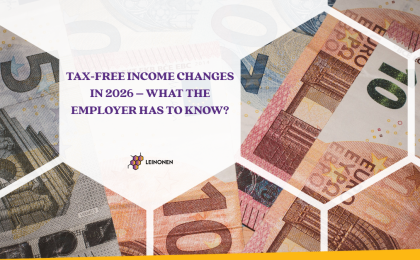The tax consultancy team of Leinonen summarises dome of the most important tax changes that took effect in 2020.
Taxes on salaries and wages
The rates of taxes on salaries and wages will not change in the new year:
- the social tax rate is 33%. The minimal monthly rate subject to social tax as of 1 January 2020 is 540 euros (instead of 500 euros in 2019), i.e. the minimal social tax payable is 178.20 euros per month.
- The rates of unemployment insurance premiums are 1.6% for employees and 0.8% for employers.
- The withheld income tax is 20%. Similar to the previous year, the amount of tax-exempt income depends on the person’s income (up to 500 euros per month and up to 6,000 euros per year). Tax-exempt income can be applied on the basis of the recipient’s request.
- The rate of the funded pension contribution is 2%. Check the existence of the withholding obligation at https://www.pensionikeskus.ee/. We also advise to check elderly employees, as the funded pension of employees who have attained retirement age, but continue working and haven’t started getting payouts from funded pension, will continue as usual.Please note that on 29 January 2020, the Riigikogu adopted the Act for Amendment of the Funded Pensions Act and Associated Acts (https://www.riigikogu.ee/). Joining or leaving the second pension pillar will become voluntary after the pension reform takes effect.
Minimum wage: it must be kept in mind when calculating payroll taxes that the hourly minimum wage is 3.48 euros as of 1 January 2020, which means that the monthly minimum wage of a full-time employee is 584 euros.
Income Tax Act
Ticket for transport to work and home
Compensation of the public transport tickets used to travel between home and work is not taxed as a fringe benefit.
Proof of tax-exemption of dividends earned abroad
As of 1 January 2020 an Estonian company, which has received dividends from a foreign company where it has a holding of at least 10%, is obliged to prove when it pays the dividends on without tax that income tax was withheld or that the share in profit that was the basis of the dividends was taxed in the foreign country irrespective of the country in which the dividend is received.
Exit tax
The change concerns Estonian companies that take their assets to a permanent establishment located in another country. The permanent establishment of a foreign company registered in Estonia, which takes its assets out of Estonia, must also take the exit tax into account. The difference between the market value and book value of the assets taken out of Estonia is subject to income tax. Transactions between parent companies and subsidiaries are not subject to exit tax.
Income tax on hybrid mismatches
Hybrid mismatches may occur in cross-border situations where different countries treat the same entity or financial instrument differently in terms of taxation, which results in repeated deduction of costs or exclusion from income. A new chapter called Taxation upon Mismatch in Tax Outcomes was added to the Income Tax Act in order to prevent such situations. The purpose of the chapter is to prevent double taxation, which is caused by the differences in the qualification of financial instruments, payments and entities in different countries as well as on the attribution of payments between the headquarters and a permanent establishment or between two or more permanent establishments of an entity.
Deadline for submission of individual tax returns extended by a month
Private individuals must declare their income earned in 2019 by 30 April 2020 (instead of the previous 31 March). The deadline for payment of income tax was also extended and is now October instead of July.
Value Added Tax Act
Call-off stock and time of supply
As of 1 January 2020, an Estonian company can transport its goods to a warehouse of another member state for a known buyer without creating the obligation to register itself as a VAT liable person in that member state.
When the conditions below are met, transporting goods to another member state will not generate Intra-Community supply of goods and the obligation to register as a tax payer in another member state, but when the call-off stock is transferred in another member state. The Intra-Community supply of goods is generated when the goods are sold from call-off stock.
Conditions of call-off supply:
- the seller does not have a permanent establishment or location in the member state;
- the seller knows who the buyer of the goods in the other member state is;
- the data of the acquirer of the goods taken to another member state are given in the Report on intra-Community Supply (form VD) when goods are taken to the member state;
- the buyer is a VAT payer;
- the goods are taken out of the warehouse within 12 months;
- both the seller and the buyer keep account of the goods.
Chain transactions
If the same goods are transferred several times in a row within the scope of a transport transaction, the 0% tax rate can only be used in the case of the sales where the goods are taken across the border to another member state.
Proving 0% supply
If the seller does not declare the transfer of the goods to a taxpayer of another member state in the VD report, they no longer have the right to treat it as 0% Community supply, but it has to be taxed as national turnover in the seller’s member state.
Investment gold
The definition of investment gold was specified in the act to make it comply with the definition used in the VAT Directive.
Tax Information Exchange Act
Tax advisers, lawyers, auditors and in certain cases companies themselves must submit to the tax authority information on cross-border tax schemes that may have a significant impact on taxation, exchange of information on financial accounts or the identification of beneficial owners.




